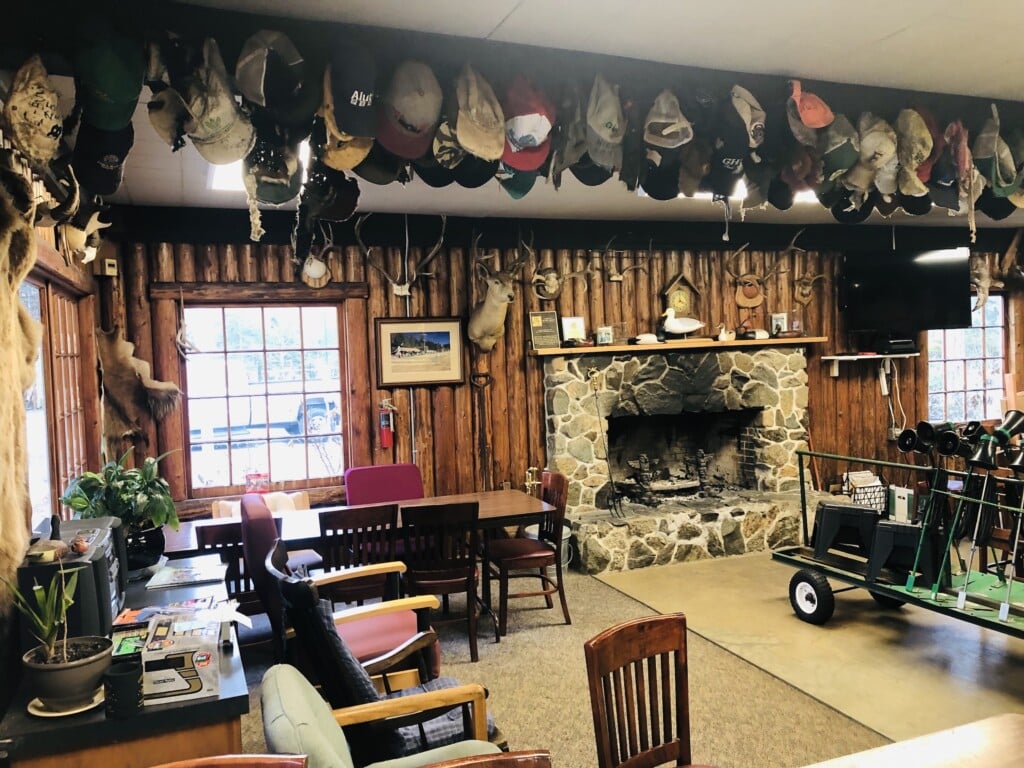Community
People taking place of trees around historic gun club
In 1947, the Gig Harbor Sportsman’s Club (GHSC), a group of shooting enthusiasts that had been around informally since the 1930s, incorporated as a Washington state nonprofit organization. Gig Harbor, which had just 803 residents by 1950, was clustered on the waterfront. A few hardy souls built small dwellings above the harbor on hills densely carpeted with trees, speckled with ponds and riven by streams. The Sportsman’s Club’s outdoor shooting range, a forest fastness on Burnham Drive, looked and felt remote from the sleepy fishing village. There were far more trees than people.
Community Sponsor
Community stories are made possible in part by Peninsula Light Co, a proud sponsor of Gig Harbor Now.
Fast-forward to the modern era.
In 2020, Gig Harbor had 12,029 residents, up a gobsmacking 69 percent from 7,126 in the 2010 U.S. Census. Many of the newcomers clustered in Gig Harbor North, near where the Sportsman’s Club has operated at 9721 Burnham Drive NW for the last 75 years.
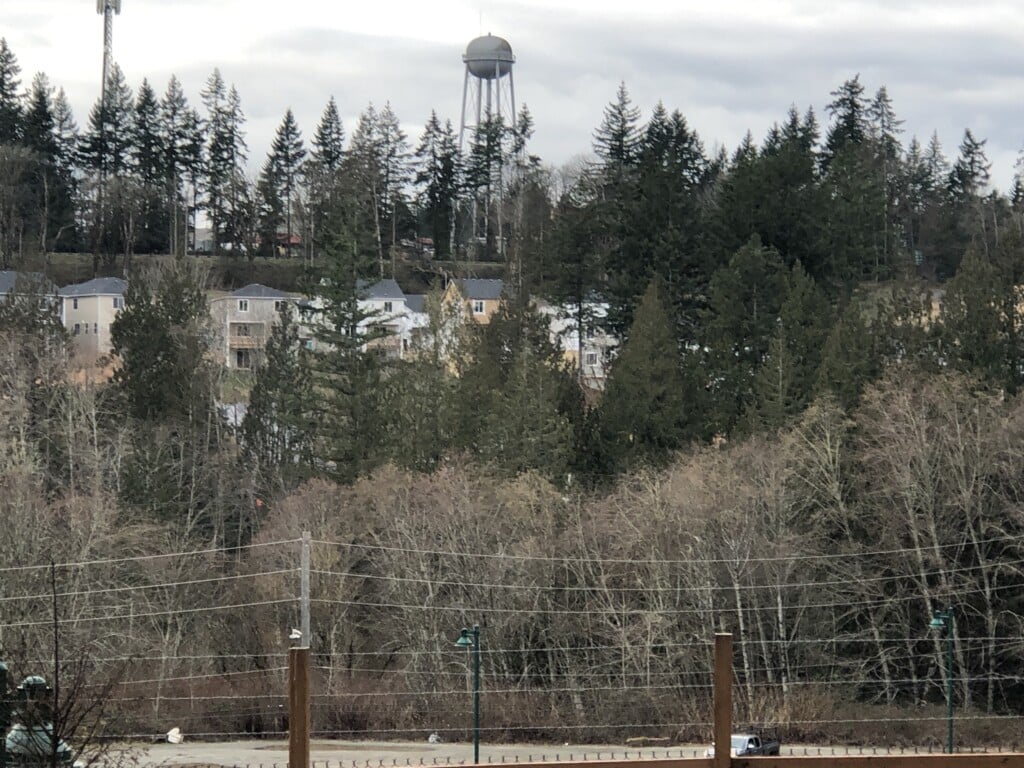
To see the gun club, high on a hill and mostly surrounded by trees, one has to drive up a long driveway, though the construction of Harbor Hill Drive opened up the west side and exposed the new North Creek housing development. New trees have been planted to eventually replace the buffering old ones. Ed Friedrich / Gig Harbor Now
The Sportsman’s Club now counts humming Borgen Boulevard, Harbor Hill Drive, car-clotted shopping centers with Target, Costco and Albertsons and an expanding YMCA among its neighbors. Last September, Swift Water Elementary School opened just 0.24 miles from the club’s property. The evening of an open house at the new school, live gunfire could be heard as people lined up to go inside; it was Thursday, when shooting at the club can legally go on until 9 p.m.
While there is no formal opposition to the historic gun club, questions about the GHSC are often raised. Is a fast-developing urban area the best place for a loud shooting range? Is it better suited to a rural location? In fact, the GHSC looked several times for land in Kitsap and Mason counties early this century, but the moves stalled, thanks to passionate opposition from prospective neighbors.
When the club pursued a move to Kitsap in 2002, a member of the Bear Lake community complained about noise and traffic and fumed to the Kitsap Sun, “Shooting will also destroy environment for ducks, eagles and osprey.’’ These and others are the same wild birds that inhabit wooded areas near the gun club in Gig Harbor.
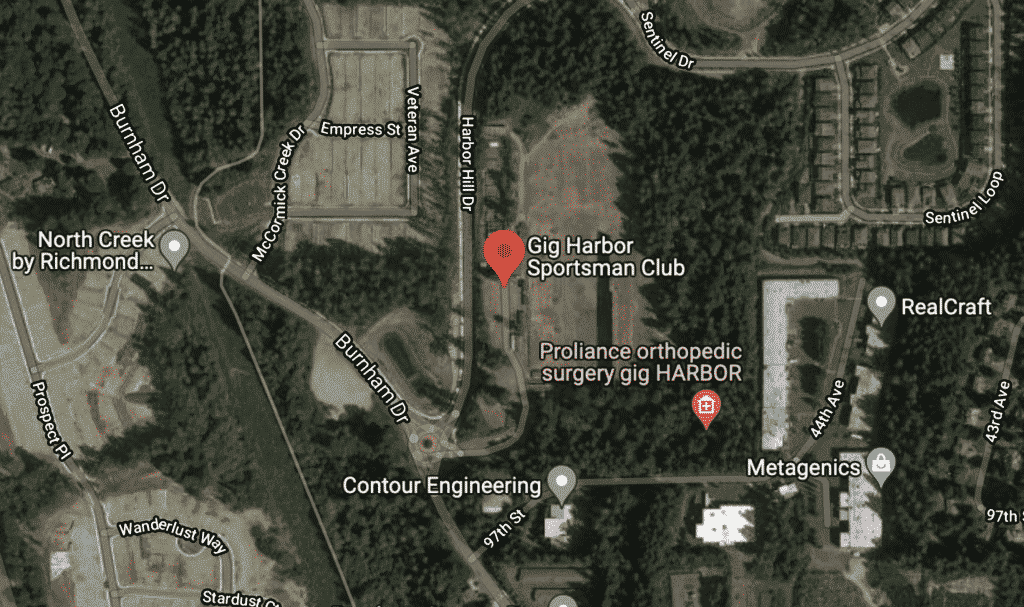
An aerial map shows housing developments encroaching on the sportsman’s club. Courtesy of Googlemaps.com
Across the street and just down the hill from the club’s main entrance on Burnham Drive, the new North Creek housing development under construction is edging close to the club’s Gig Harbor redoubt, too.
Along with questions comes concern. In addition to generating endemic noise, shooting ranges — there are 20 in the Puget Sound area — are criticized for emitting lead pollution from spent lead bullets that threatens human health and wildlife. The GHSC, cited by public agencies as a source of dramatically high lead levels in water downstream from its property, scored poorly in scientific tests as far back as 2002. In 2012, the GHSC was sued by a Gig Harbor resident for allegedly polluting a small creek with lead and unknowingly allowing spent bullets to land on the plaintiff’s property. The case was settled quietly.
Club leaders maintain the GHSC complies with all environmental regulations, makes good-faith efforts to work with authorities and takes care to mend fences with neighbors.
City ordinance delineates when shooting can occur
“We have a long, long history in Gig Harbor,’’ says Le Rodenberg, a Gig Harbor City Councilman who served 12 years as president of the GHSC and sits on its board of directors. “We heard the complaints about noise in the city. We are governed by a city ordinance that determines our hours and what we can do. And we comply fully. We’ve never had a violation of that ordinance.’’
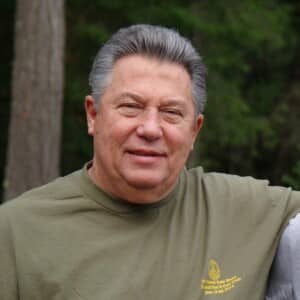
Gig Harbor City Councilman Le Rodenberg served 12 years as president of the GHSC and sits on its board of directors. Photo courtesy of Gig Harbor Sportsman's Club
The ordinance, enacted by the City Council in 2003, licensed the Sportsman’s Club as an amusement/recreational services facility. Presently, the club’s outdoor range operates five days a week; it closes on Monday and Tuesday and major holidays. Exceptions are special events that the club hosts on-property. Such events can take place outside normal hours and days. Some draw large crowds from across the Pacific Northwest and Canada. A few generate heavy traffic.
The Rockin’ Rhythm & Blues Festival, held annually, features food, drink, crafts and live music. In 2021, it ran for nine hours. ”We had over 500 cars on our property,’’ Rodenberg marvels. Tickets sold for $30-35 apiece. Such events typically benefit charities such as food banks, veterans groups, first responders and students. “We give away three $750 scholarships to the high schools in town.’’
In September, the club will host the annual three-day SeaFood Trap Shooting competition. Gig Harbor’s lodging tax committee awarded the Sportsman’s Club a $4,500 grant for the event.
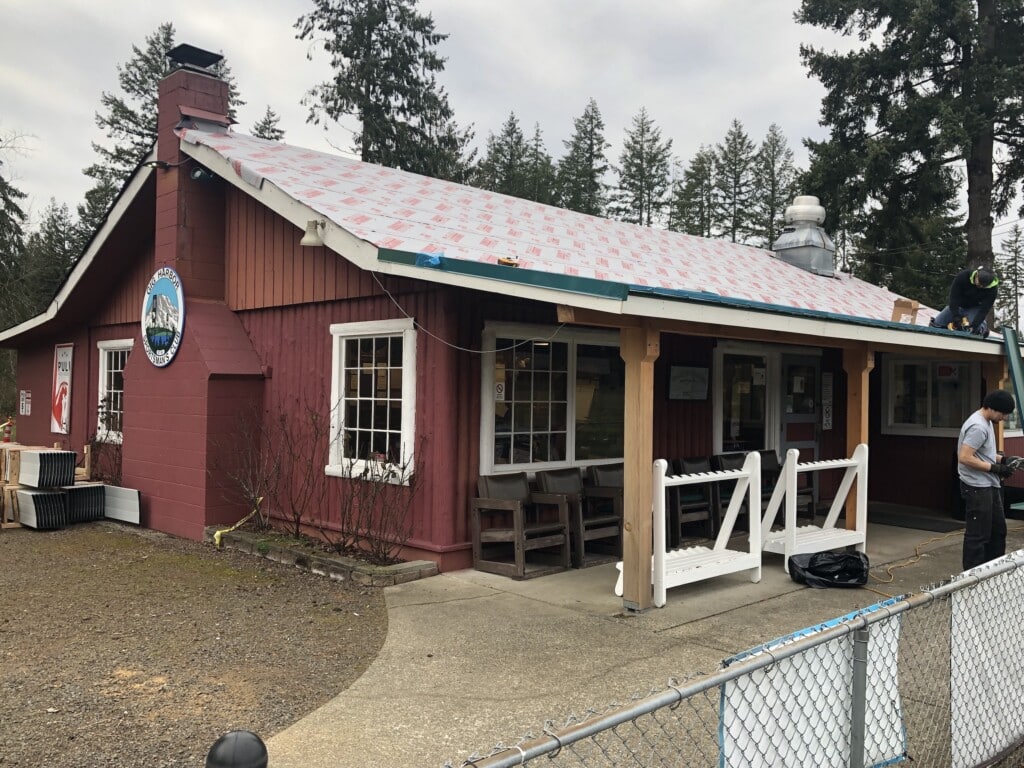
The clubhouse was built in 1950 in a unique vertical log style. It’s in the process of getting a new metal roof. Ed Friedrich / Gig Harbor Now
The Sportsman’s Club displays a certain panache when it comes to community-minded public relations. In 2020, early in the COVID-19 pandemic lockdowns, the club opened its unused commercial-grade kitchen free of charge for Gig Harbor resident Michelle Brenner, aka the Lasagna Lady, who cooked up rich, flavorful lasagna that she gave away to anyone who wanted or needed it.
“She cooked in our kitchen for about six months,’’ Rodenberg recalls. The feel-good, taste-good story made the national news. Brenner appeared on the “Today Show,’’ CNN and elsewhere. The Washington Post quoted Rodenberg talking about the Lasagna Lady — and the Sportsman’s Club.
Rodenberg is a multitasker. In the late ‘teens, he helped the club monitor construction of Harbor Hill Drive after the city decided the area needed a new road across club property. When the road was built, the city did what Rodenberg says were extensive infrastructure improvements at the club and paid for the land. Asked how much money the club got, Rodenberg says he doesn’t recall. When the extension was completed in 2018, media accounts reported the total budget at $9 million.
More people around to hear the noise
Which brings us back to noise. “With the Harbor Hill expansion, they cut down a lot of trees,’’ Rodenberg observes, “and trees help cut down on noise. On our property, we are planting trees.’’ It will take some time before they become the buffer that their predecessors were.
Rodenberg, who was elected to the City Council in 2019, chatted up prospective homebuyers in the Harbor Hill neighborhood in Gig Harbor North. He wanted to hear what they thought about easily audible shooting from the nearby Sportsman’s Club. “When I first came here, I didn’t like it,’’ several visitors to hilltop Sentinel Drive said, according to Rodenberg. “Now, I don’t even notice.’’
It’s not a universally shared opinion. Just down the hill in the Heron’s Key senior living community, 0.8 miles from the club, some residents said they view the persistent percussive sound of gunfire as a public nuisance. Shooting can go on almost nonstop for up to four hours a day and can be heard inside homes even when doors and windows are closed.
Exposure to noise can have adverse effects on health, according to medical authorities. This is especially true for people close to the source of noise, such as shooters in a gun range. According to the Montpelier, Vt.-based Noise Pollution Clearinghouse, “Noise negatively affects human health and well-being. Problems related to noise include hearing loss, stress, high blood pressure, sleep loss, distraction and lost productivity, and a general reduction in the quality of life …’’
At the aforementioned Swift Water Elementary School, principal David Brooks referred our questions about gunfire noise to the Peninsula School District’s communications director, Aimee Gordon. “The school does occasionally hear sounds’’ from the club, Gordon wrote in a statement, “but this is after hours, so it does not affect school activities. Sounds from the club are not heard during the school days, and cannot be heard inside the building.’’
Outside, though, shooting noise might be hard to ignore. The club’s posted hours show rifle and pistol shooting from 11 a.m.-3 p.m. Wednesdays and Fridays. On those days, schoolchildren and staff might well hear live gunfire from the shooting range.
Community relations are good
Rodenberg avers that the club’s community relations are good. “We have a wonderful relationship with the city. A good number of city staff are club members.’’ All told, the Sportsman’s Club has 2,000 dues-paying members, down from 2,400 before the pandemic.
The GHSC takes pains to keep members, guests, its National Rifle Association-certified shooting instructors, and neighbors safe from errant shots. The 35-acre club grounds include a 50-foot-high, 500-foot wide, thick fabric wall to block and contain ammo.
Importantly, the club teaches young and old how to shoot safely and accurately. When Washington state required applicants for hunting licenses to take a training course, the club trained some 3,000 people. Member volunteers teach classes and oversee safety procedures.
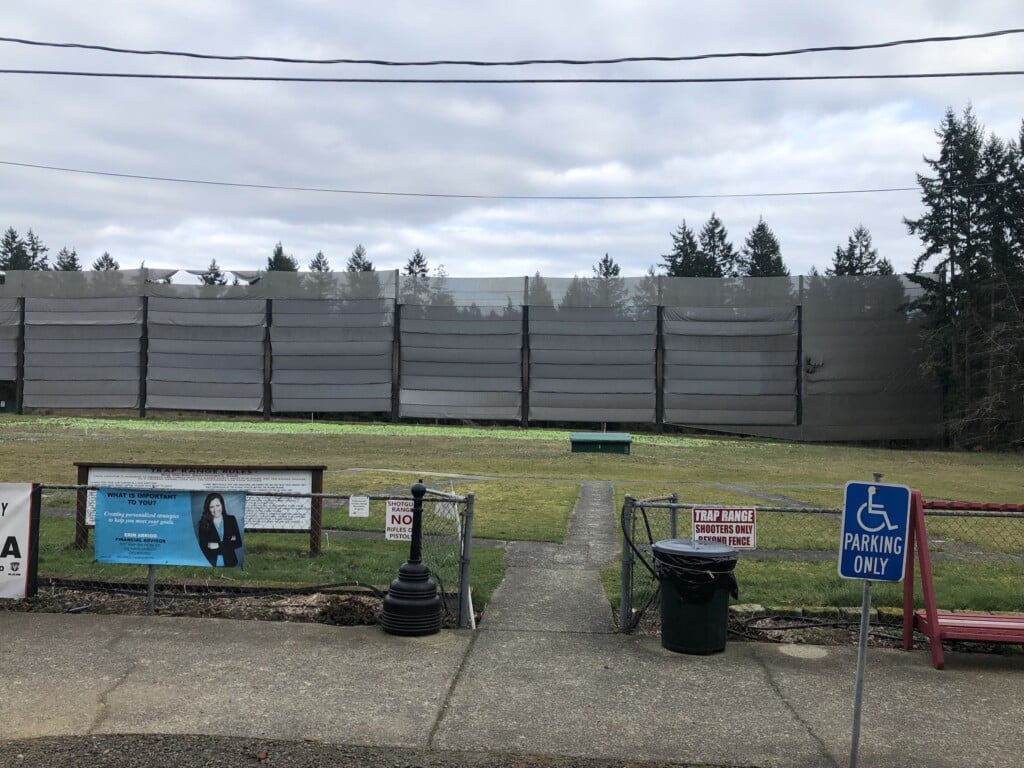
A 50-foot-high, 500-foot wide, thick fabric wall blocks and contains shotgun ammo. Ed Friedrich / Gig Harbor Now
Growing numbers of women are among the new shooters. Driven in part by a perceived need for self-defense, women sometimes find they like shooting and return to the range for fun. The club’s website lists a link to Armed Women of America, a nationwide nonprofit group, and hosts an AWA chapter with nearly 60 members. All told, there are an estimated 10,000 outdoor and indoor shooting ranges in America, and 40 million recreational shooters, according to a 2014 five-part series in the Seattle Times.
Rodenberg believes regulated, responsible shooting ranges like the GHSC are a community asset. “Our 2,000 members are going to shoot,” he says. Without a shooting range, “people will shoot in gravel pits, backyards, out in the woods. We don’t want people out there shooting indiscriminately.”
Rodenberg says that the Gig Harbor club, unlike some shooting ranges, has not had a case of lead poisoning among volunteer staffers or frequent visitors. The GHSC improved the ventilation in its covered shooting stands, blowing heat and lead-infused dust and fumes away from the shooters, Rodenberg said. Moreover, “We have signs everywhere: ‘Don’t forget to wash your hands.’”
Lead contamination has proven challenging
Water-borne lead contamination has proven challenging and time-consuming for the club. The water is not used as drinking water for people. It does, however, threaten aquatic life, such as the signature fish of the the Pacific Northwest: salmon.
The first bad news about polluted water for the GHSC came 20 years ago. In 2002, the Pierce County Health Department took water and soil samples from an intermittent unnamed tributary of North Creek where it flows across club property. The Health Department found very high dissolved lead concentrations of 19.5 micrograms per liter, exceeding the state’s aquatic life criteria of 0.237 micrograms per liter.
In April 2008, the state Department of Ecology tested levels of dissolved lead in the tributary and in North Creek that were consistent with the county’s numbers, concluding that they “are the highest that have been found in surface waters of Washington state.’’ From December 2009 through March 2010, additional Ecology studies identified the GHSC as “a major source of lead in the creek.’’ According to the Ecology report, concentrations of lead downstream from the club “continue to be extremely elevated, exceeding Washington state aquatic life chronic criteria by a factor of over 1,000.’’
North Creek is home to ongoing efforts to restore the stream as a healthy habitat for young salmon.
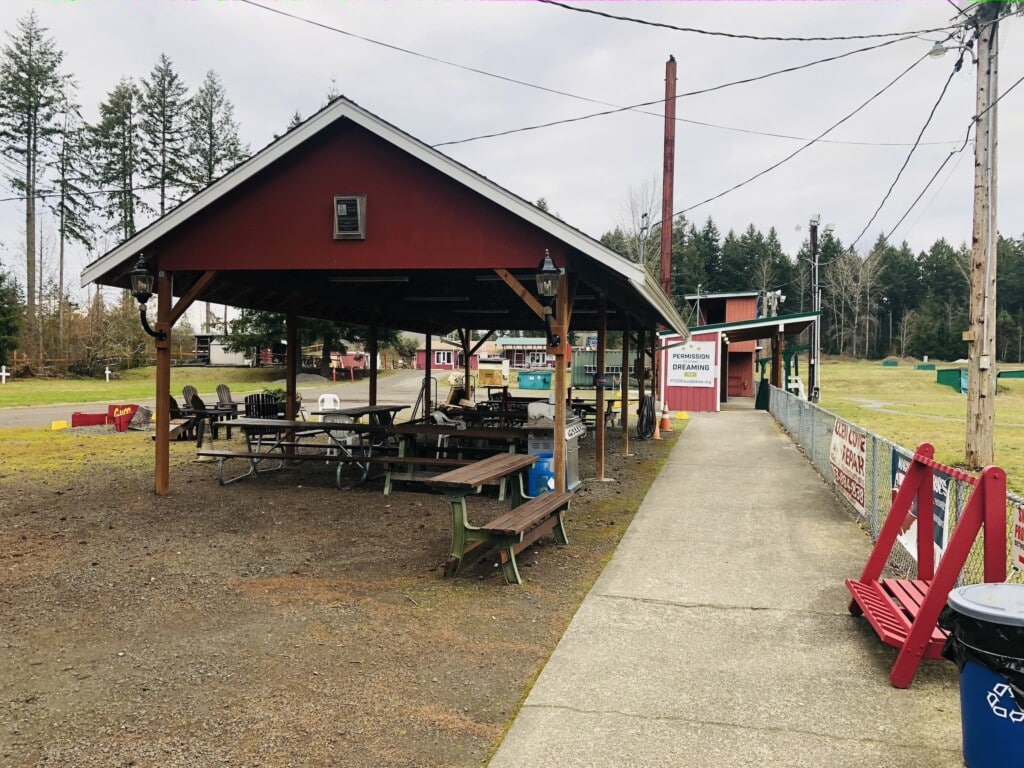
Picnic shelter between the clubhouse and pistol range with RV sites on the left. Ed Friedrich / Gig Harbor Now
Ecology’s toxic cleanup staff has, according to both Rodenberg and the department, talked at various times to club representatives about best practices for lead abatement and how the Sportsman’s Club can improve its performance. Following its inception in November 2015, that process ground to a halt.
“We’re not as far along as we’d like,’’ allows Marian Abbett, unit supervisor in the Olympia office of the state Department of Ecology. ”I want to emphasize that’s not the fault of the Gig Harbor Sportsman’s Club. The GHSC completed the investigation of contamination and submitted the draft Remedial Investigation Report on Oct. 1, 2015. This submittal was on schedule with the agreed order.’’
However, Abbett adds, “Ecology’s project manager for this site is no longer with Ecology, and thus the report has not been reviewed. We are in unprecedented times with a large number of vacancies in our program … As we bring on new project managers, we will reassign this project and move forward with the review of the Remedial Investigation Report.’’ There’s no telling when that might be.
The Sportsman’s Club’s on-again, off-again plan to move out of Gig Harbor is another major issue that remains stalled. Resistance from would-be host communities is the big reason why. “It’s impossible to open a shooting range,’’ Rodenberg declares. There is pushback from “neighbors, anti-violence elements, people concerned about pollution.’’ Of the club’s search committees, he says, “They would find a place, the paperwork would be done, and then …’’
Bottom line: The Sportsman’s Club is staying put, with all its virtues, vicissitudes and uncertainties. At least for now.


